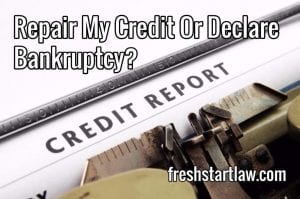Repair My Credit Or Declare Bankruptcy?

When you’re facing a financial difficulty, you may decide to repair your credit or file for bankruptcy. Let’s take a closer look at both options.
Loaded down by unpaid debt? Speak with a trusted Baltimore bankruptcy attorney today. Contact Sirody & Associates for a free consultation. Or call (410) 415-0445.
Repair My Credit
Credit repair means taking steps yourself, or hiring an agency, to improve your credit score. The first step is to find out the details of your credit report. You are permitted, by law, to access your credit score for free once every 12 months. Sites like AnnualCreditReport.com can help guide you through this process.
Once you have your credit report in hand, read it very carefully. You may be surprised to find errors on the report, such as lines of credit that you never applied for. In some cases, you might even discover that you are the victim of credit fraud. Any disputes must be filed with each individual credit agency.
Finally, credit repair involves implementing healthy financial habits like saving and paying all bills or loans on time, in full.
Declare Bankruptcy
Unlike credit repair, bankruptcy is a legal process that allows you to settle debts that are beyond your current means to pay. This debt could be due to medical bills, the loss of a job or other unexpected expenses.
Bankruptcy may involve the sale of nonexempt assets to pay off your debt, as in Chapter 7 bankruptcy. In Chapter 13 bankruptcy, a debt repayment plan is arranged usually with a term of 3-5 years. Once the bankruptcy process is finalized, the debts covered in the filing are considered to be settled (or discharged).
It’s important to understand that while filing for bankruptcy will negatively impact your credit score, your rating can eventually recover.
Conclusion
Every personal financial situation is different and should be carefully evaluated. For example, if you get turned down for a car loan due to poor credit, this doesn’t mean you have to declare bankruptcy. On the other hand, no amount of credit repair will help a situation where you have loads of debt piling up month after month.
If you do choose to file for bankruptcy, you can later begin the credit repair process. In fact, part of bankruptcy involves credit counseling in which you’ll learn sound financial habits that will help you avoid future debt problems – and this is good for your credit score.
Credit repair and bankruptcy are each used for specific circumstances. If you’re not sure which one is right for you, it may be wise to consult with a credit repair agency or an experienced bankruptcy attorney.
Complex debt situation? Speak with a trusted Baltimore bankruptcy attorney now. Contact Sirody & Associates for a free consultation. Or call (410) 415-0445.
